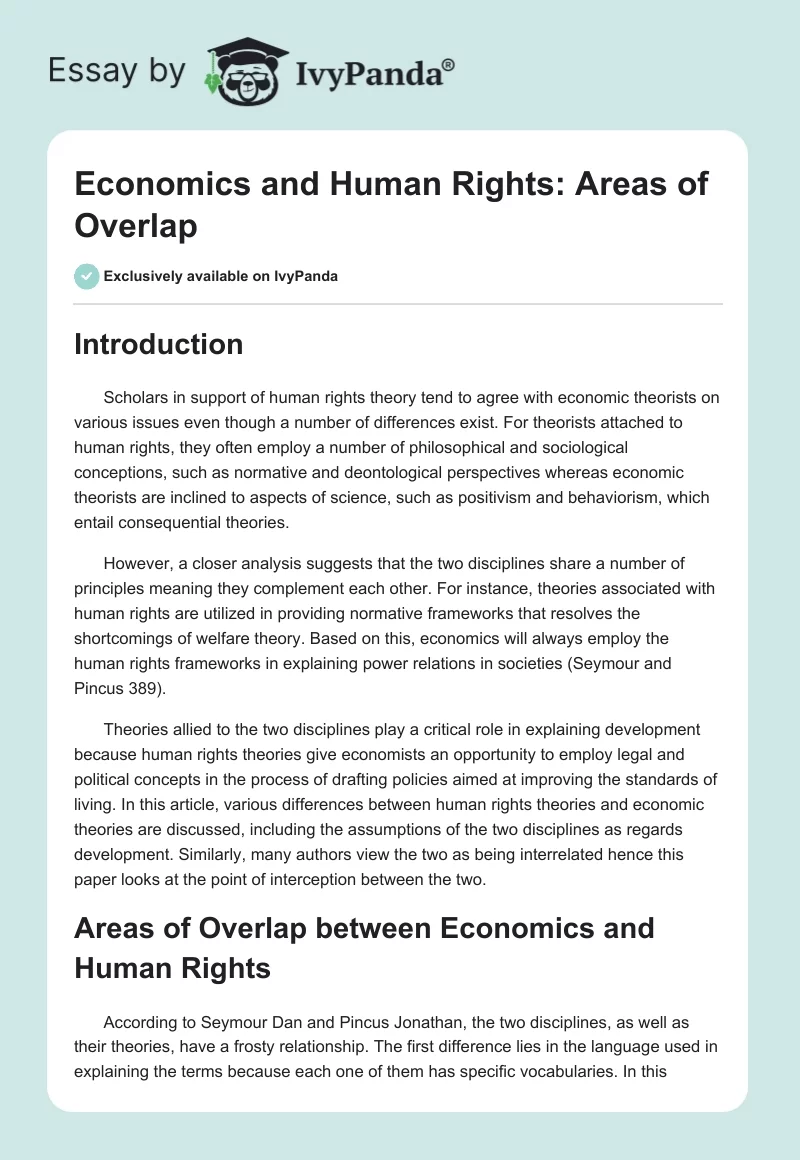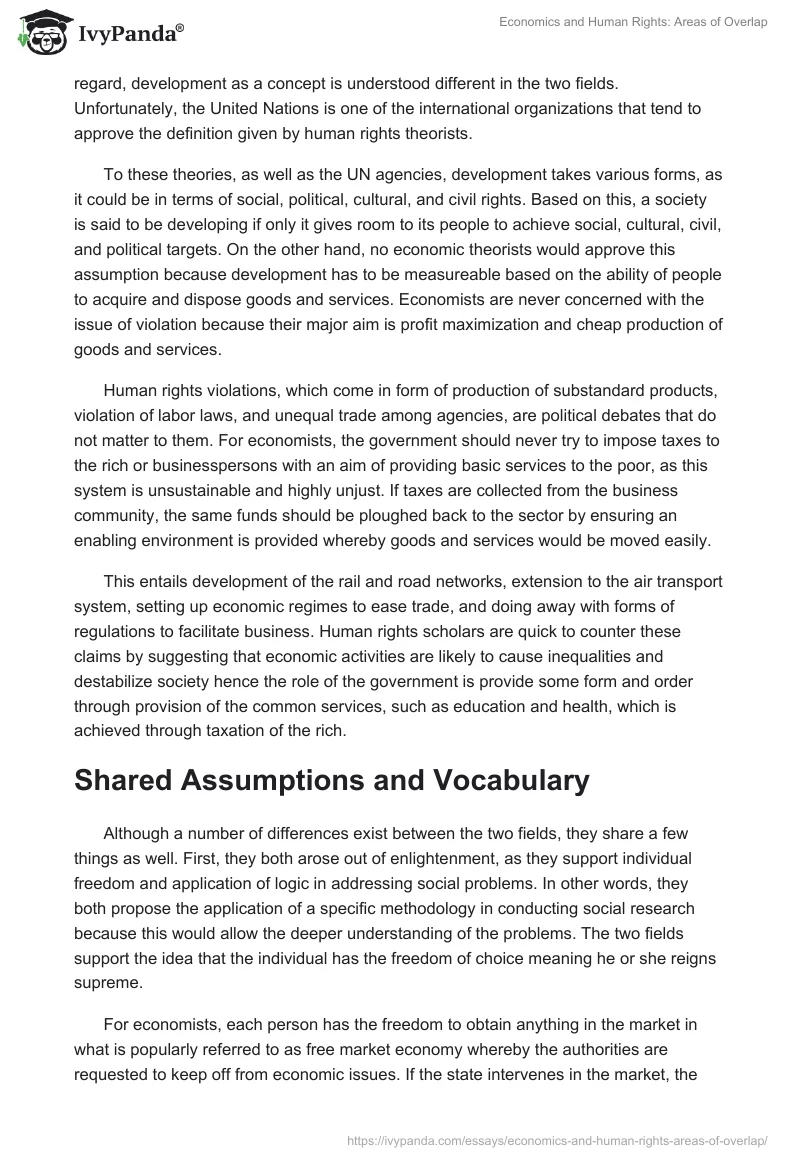Introduction
Scholars in support of human rights theory tend to agree with economic theorists on various issues even though a number of differences exist. For theorists attached to human rights, they often employ a number of philosophical and sociological conceptions, such as normative and deontological perspectives whereas economic theorists are inclined to aspects of science, such as positivism and behaviorism, which entail consequential theories.
However, a closer analysis suggests that the two disciplines share a number of principles meaning they complement each other. For instance, theories associated with human rights are utilized in providing normative frameworks that resolves the shortcomings of welfare theory. Based on this, economics will always employ the human rights frameworks in explaining power relations in societies (Seymour and Pincus 389).
Theories allied to the two disciplines play a critical role in explaining development because human rights theories give economists an opportunity to employ legal and political concepts in the process of drafting policies aimed at improving the standards of living. In this article, various differences between human rights theories and economic theories are discussed, including the assumptions of the two disciplines as regards development. Similarly, many authors view the two as being interrelated hence this paper looks at the point of interception between the two.
Areas of Overlap between Economics and Human Rights
According to Seymour Dan and Pincus Jonathan, the two disciplines, as well as their theories, have a frosty relationship. The first difference lies in the language used in explaining the terms because each one of them has specific vocabularies. In this regard, development as a concept is understood different in the two fields. Unfortunately, the United Nations is one of the international organizations that tend to approve the definition given by human rights theorists.
To these theories, as well as the UN agencies, development takes various forms, as it could be in terms of social, political, cultural, and civil rights. Based on this, a society is said to be developing if only it gives room to its people to achieve social, cultural, civil, and political targets. On the other hand, no economic theorists would approve this assumption because development has to be measureable based on the ability of people to acquire and dispose goods and services. Economists are never concerned with the issue of violation because their major aim is profit maximization and cheap production of goods and services.
Human rights violations, which come in form of production of substandard products, violation of labor laws, and unequal trade among agencies, are political debates that do not matter to them. For economists, the government should never try to impose taxes to the rich or businesspersons with an aim of providing basic services to the poor, as this system is unsustainable and highly unjust. If taxes are collected from the business community, the same funds should be ploughed back to the sector by ensuring an enabling environment is provided whereby goods and services would be moved easily.
This entails development of the rail and road networks, extension to the air transport system, setting up economic regimes to ease trade, and doing away with forms of regulations to facilitate business. Human rights scholars are quick to counter these claims by suggesting that economic activities are likely to cause inequalities and destabilize society hence the role of the government is provide some form and order through provision of the common services, such as education and health, which is achieved through taxation of the rich.
Shared Assumptions and Vocabulary
Although a number of differences exist between the two fields, they share a few things as well. First, they both arose out of enlightenment, as they support individual freedom and application of logic in addressing social problems. In other words, they both propose the application of a specific methodology in conducting social research because this would allow the deeper understanding of the problems. The two fields support the idea that the individual has the freedom of choice meaning he or she reigns supreme.
For economists, each person has the freedom to obtain anything in the market in what is popularly referred to as free market economy whereby the authorities are requested to keep off from economic issues. If the state intervenes in the market, the result would be negative because private investors would shy away from controlled markets. For some economists, the state simply intervenes to bring balance, especially when there is turmoil, such as economic crisis, which leads to inflation. However, a few other economists suggest that the presence of the government in financial matters should be permanent because of the various health and safety concerns.
For such theorists, consumers cannot be left in the hands of traders because exploitation is likely to take place. Additionally, economics have always appreciated the role of human rights theorists because property right, which is an issue to many of them, cannot exist without the understanding of universal rights. Human rights focus most on the development of the legal structure to protect the weak and the less fortunate in society.
Similarly, economists rely on the legal frameworks to protect properties and other business rights, such as copyrights and patents. Whenever human rights groups move to court to seek clarification on certain issues, economic institutions would always support them. Access to human rights call on an individual to establish an income meaning that economic power is one of the requirements, as well as an issue to human rights activists.
How the Two Fields can Help Each Other
It is noted that human rights and economics are not different, as one would imagine, because they share a number of concepts and principles. The two disciplines have different approaches to social issues, especially the issue of development because economics is concerned with the process while human rights as a field look at the outcome. On the issue of freedom, human rights insist on allowing an individual to do as he or she wishes while at the same time respecting the views of others. Economics advocate for the same thing, but the approach is different, as it gives an individual financial freedom.
Some analysts observe that economics should extend its scope to cope other forms of rights apart from property rights only. Economists try to understand power relations and the various forms of exploitations that go on in society, but they are not addressed adequately because less attention is often given to them. Issues that human rights tackle in society are created by economic activities and if they are to be resolved properly, the two fields should consider working together. For instance, unemployment and racial discrimination is a serious issue to human rights activists, but dealing with them has proved ineffective because they are multidisciplinary problems.
Works Cited
Seymour, Dan, and Pincus Jonathan. Human rights and economics: the conceptual basis for their complimentarity. Development Policy Review 26. 4 (2008): 387-405. Print.


